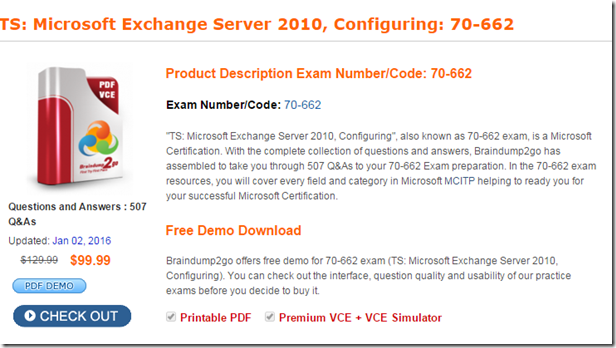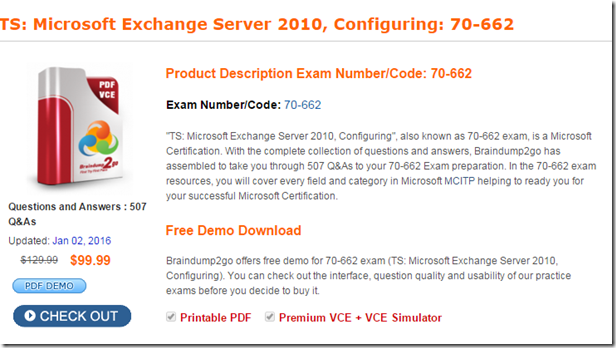MICROSOFT NEWS: 70-662 Exam Questions has been Updated Today! Get Latest 70-662 VCE and 70-662 PDF Instantly! Welcome to Download the Newest Braindump2go 70-662 VCE&70-662 PDF Dumps: http://www.braindump2go.com/70-662.html (507 Q&As)
New Released Braindump2go Microsoft 70-662 Dumps PDF – Questions and Answers Updated with Microsoft Official Exam Center! Visit Braindump2go and download our 70-662 Exam Questions Now, Pass 70-662 100% at your first time!
Exam Code: 70-662
Exam Name TS: Microsoft Exchange Server 2010, Configuring
Certification Provider: Microsoft
Corresponding Certifications: MCITP, MCITP: Enterprise Messaging Administrator on Exchange 2010, MCTS, MCTS: Microsoft Exchange Server 2010, Configuring
70-662 Dumps,70-662 PDF,70-662 PDF eBook,70-662 Braindump,70-662 Study Guide,70-662 Book,70-662 Practice Test,70-662 Dumps PDF,70-662 VCE,70-662 VCE Dumps,70-662 Valid Dumps,70-662 Exam Questions Free,70-662 Dumps,70-662 Free Dumps,70-662 Questions and Answers Free,70-662 Braindump PDF,70-662 Braindump VCE,70-662 Preparation

QUESTION 151
You install a new Exchange server 2010 organization that contains two Hub Transport servers named Hub1 and Hub2.
Hub1 and Hub2 are configured as mail servers for your organization in the public DNS zone.
You notice that Hub2 rejects all SMTP connections from internet hosts.
What Should you do?
A. Uninstall the antispam agents from Hub1.
B. Install the same trusted public certificate on Hub1 and Hub2.
C. Modify the permissions for the Client Hub2 Receive connector.
D. Modify the permissions for the Default Hub2 Receive connector.
Answer: D
QUESTION 152
You have an Exchange organization that contains Exchange Server 2003 Service Pack 2 (SP2) servers.
All servers are members of one Administrative Group and one Routing Group.
You plan to transition the organization to a hosted Exchange Server 2010 environment.
You need to prepare the Exchange organization for the deployment of Exchange Server 2010 Mailbox, Client Access, and Hub Transport servers.
What should you do first?
A. Disable all link state updates.
B. Create a Routing Group connector.
C. Modify the Active Directory schema.
D. Delete all Recipient Update Service (RUS) objects.
Answer: C
QUESTION 153
You have two Exchange Server 2010 Service Pack 1 (SP1) servers named Server1 and Server2. Server1 has the Mailbox server role installed.
Server2 has the Hub Transport and Client Access server roles installed.
You need to ensure that users can send e-mail and receive e-mail by using Windows Live Mail or Microsoft Outlook Express.
What should you do?
A. From the command Prompt on server1, run net start MsExchangePOP3
B. From the command Prompt on Server2, run net start MsExchangePOP3
C. On Server1 and Server2, modify the properties of the MsExchangePOP3 (TCP-in) Windows
Firewall rule
D. On Server1, modify the properties of the MsExchangeIMAP4 (TCP-in) Windows Firewall rule.
On server2, modify the properties of the client receive connector
Answer: B
QUESTION 154
You have an Exchange that contains the exchange servers shown in the following table:
You plan to move all mailboxes from server2 and server3 to server4.
You need to ensure that all users can send and receive e-mail messages after their mailboxes are moved to server4.
What should you do?

A. Create an SMTP Site Link.
B. Create a Routing Group and a Routing Group Connector.
C. Install the Exchange Server 2010 Hub Transport Server Role on Server4.
D. Install the Exchange Server 2010 Edge Transport server role on a new server.
Answer: C
Explanation:
http://technet.microsoft.com/en-us/library/dd638130.aspx
http://technet.microsoft.com/en-us/library/bb124350.aspx
http://technet.microsoft.com/en-us/library/gg232715.aspx
QUESTION 155
You have two Exchange Server 2010 Mailbox named Server1 and Server2.
You need to move a user’s mailbox from Server1 to Server2.
Your solution must minimize downtime for the user.
Which cmdlet you run?
A. Movemailbox.
B. Export-Mailbox.
C. Set-MoveRequest.
D. New-MoveRequest.
Answer: D
QUESTION 156
You plan to install Exchange Server 2010 Service Pack 1 (SP1) servers in an existing Exchange Server 2007 organization.
All servers will coexist in a single Active Directory site.
You need to identify which role must be transitioned to Exchange Server 2010 first.
Which role should you identify?
A. Unified Messaging (UM)
B. Hub Transport
C. Client Access
D. Mailbox
Answer: C
QUESTION 157
You have an Active Directory forest that contains a single site.
Your organization contains the Exchange Server 2010 servers shown in the following table:
All clients connect from the Internet by using IMAP4.
You need to prevent some users from using IMAP4 to connect to the mailboxes Server5.
What should you do?

A. Modify the IMAP4 retrieval settings on Server5.
B. Disable the IMAP4 mailbox feature for the mailboxes on Server5.
C. On Server5, configure Windows Firewall to block TCP port 25 and TCP port 110.
D. On Server5, configure Windows Firewall to block TCP port 110 and TCP port 995.
Answer: B
QUESTION 158
You network contains an Exchange Server 2010 Mailbox server.
You install and configure a thirdparty antivirus application on the server.
You discover that a mailbox database named DB1 does not mount.
You attempt to mount the mailbox database and receive an error message starting that the file named E01.log cannot be found.
You need to mount DB1.
The solution must prevent the antivirus application from causing the same error.
What should you do?
A. Disable the antivirus application.
Restore E01.log from the most recent backup.
Run the mount- database DB1 command.
B. Disable the antivirus application.
Restore DB1 from the most recent backup.
Run the mount- database DB1 command.
C. Exclude the transaction log folder from the antivirus application scans.
Restore E01.log from the antivirus quarentine.
Run the mount-database DB1 command.
D. Exclude the transaction log folder from the antivirus application scans.
Restore DB1 from the most recent backup.
Run the mount-database DB1 command.
Answer: A
QUESTION 159
You have an Exchange organization named contoso.com.
All servers in the organization have Exchange Server 2010 Service Pack 1 (SP1) installed.
The organization contains a mail-enabled Domain Local group named Group1.
Users from outside the organization report that all e-mail messages sent to [email protected] generate a non-delivery report (NDR).
You need to ensure to [email protected].
What should you modify for Group1?
A. The Advanced settings
B. The Group scope
C. The Group type
D. The mail flow settings
Answer: D
QUESTION 160
You have an Exchange Server 2010 organization.
In the AD exists Site 1 and Site 2, with two CAS Servers each one.
All Mailbox databases are replicated on Mailbox Servers in both sites.
All users connect to their mailboxes using Microsoft Outlook 2003.
The array named array.contoso.com is created in Site 1.
Configure all users to connect to array1.contoso.com.
You verify that all users can connect successfully to array.contoso.com.
One month later, all servers in Site 1 fail.
You need to ensure that users can connect to CAS in Site 2 by using array1.contoso.com.
What should you do?
A. Create a CAS array named array2.contoso.com in site 2.
Rename array2.contoso.com to array1.contoso.com
B. Create a CAS array named array2.contoso.com in site 1.
Remove all CAS from array1.contoso.com
C. Modify A record for array1.contoso.com to point to the IP address of a CAS Server in site 2
D. Modify A record for autodiscover.contoso.com to point to the IP address of a CAS Server in
site 2
Answer: C
Want Pass 70-662 Exam At the first try? Come to Braindump2go! Download the Latest Microsoft 70-662 Real Exam Questions and Answers PDF & VCE from Braindump2go,100% Pass Guaranteed Or Full Money Back!
FREE DOWNLOAD: NEW UPDATED 70-662 PDF Dumps &70-662 VCE Dumps from Braindump2go: http://www.braindump2go.com/70-662.html 507 Q&As)